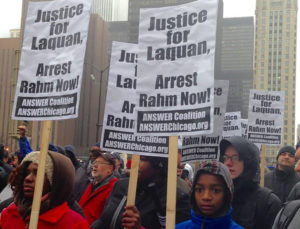 On Aug. 30 Chicago Mayor Rahm Emanuel announced the details of a proposal to replace the Independent Police Review Authority. Though presented as a serious effort at reforming the city’s police oversight body, the proposal is in truth nothing but an attempted con on the people of Chicago.
On Aug. 30 Chicago Mayor Rahm Emanuel announced the details of a proposal to replace the Independent Police Review Authority. Though presented as a serious effort at reforming the city’s police oversight body, the proposal is in truth nothing but an attempted con on the people of Chicago.
Currently accusations of misconduct against the Chicago Police Department are overseen by the Independent Police Review Authority (IPRA). The head of IPRA is appointed by the mayor and approved by the city council with no direct accountability to the people of Chicago. IPRA itself is largely ineffective and ceremonial. IPRA can investigate accusations of police misconduct and issue disciplinary recommendations to CPD but has no ability to enforce these recommendations. While CPD brutalizes and murders with near impunity, IPRA shakes its head sadly and does nothing.
The mayor’s proposal to replace IPRA with the Civilian Office of Police Accountability (COPA) comes amidst an ongoing scandal over the police murder of Laquan McDonald and the attempted cover-up of that murder by the Emanuel administration. McDonald was murdered by a CPD officer in October 2014. The officer claimed McDonald had threatened him with a knife but when a judge forced the Emanuel administration to release footage of the murder after months of stalling, the video showed the officer firing sixteen times into McDonald’s prone body.
Shouts of “Sixteen shots and a cover-up!” have become ubiquitous at protests against police brutality in Chicago. The killer officer is currently under indictment and the federal Justice Department has launched a probe of Chicago police practices.
This is the political environment into which the mayor has introduced the COPA proposal. The proposal, however, amounts to little more than sleight-of-hand intended to deceive the people of Chicago. Currently the head of IPRA is appointed by the mayor. In ‘contrast,’ under the new ordinance a police inspector general, or ‘police conduct watchdog,’ would be appointed by the city inspector general. Of course, the city inspector general is appointed by the mayor.
Whereas IPRA’s disciplinary recommendations can be silently ignored by the CPD superintendent, COPA’s recommendations would require a response within 90 days. The superintendent would still be free to ignore those recommendations but would at least have to acknowledge that they existed. Unlike IPRA, COPA would investigate misuse of tasers as well as psychological coercion. Obviously we can trust a body appointed by the same mayor that covered-up evidence of a murder for months, a body lacking any actual power beyond sternly worded letters, to reform a police department notorious for racism, lies, torture, and murder.
Some members of the Chicago city council are floating the idea that a civilian board could be created that would advise on the hiring of COPA’s leadership. The mayor’s current proposal does not include such a board and even if such language were added it would represent little more than a watered-down version of a frequent demand in Chicago: an elected oversight board with actual disciplinary enforcement powers.
Chicago remains, like all major American cities, a territory occupied by a heavily armed, quasi-military force which terrorizes and kills with little fear of consequence.
The movement against police brutality and for black lives in Chicago has many currents and demands, ranging from proposed reforms such as elected civilians monitoring the police to revolutionary calls for the abolition of the capitalist police state in its entirety. The mayor’s latest proposal for the creation of COPA doesn’t satisfy even the most lukewarm of demands for reform. It is nothing but a name change and disingenuous expansion of responsibility without any real expansion of power for the already existing IPRA. Mayor Emanuel is playing a shell game with the people of Chicago, urging them to keep their eyes on the bureaucratic process and not on the bodies bleeding in the streets.






